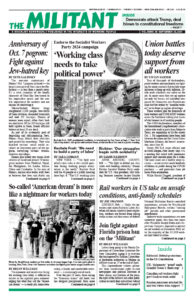Tens of thousands of dockworkers, postal workers and machinists are fighting for union contracts that include wage increases to keep up with inflation, livable work schedules and safety on the job. In many cases they are up against not only the bosses, but anti-labor laws passed by Democrats and Republicans alike that bar strikes by “essential workers” or tie them up in piles of red tape.
These workers join the thousands of hotel workers and 17,000 AT&T workers across the Southeast striking over issues of vital interest to all working people.
The 45,000 dockworkers, members of the International Longshoremen’s Association who work at ports from Maine to Texas, are organizing to hit the streets Oct. 1. No negotiations have been held between the union and the United States Maritime Alliance, the bosses’ association, since June 10.
Nearly 300 ILA union officials met in North Bergen, New Jersey, Sept. 4-5, a meeting that ended with unanimous support and concrete plans for a strike. The main issues are a healthy wage increase — ocean carriers made hundreds of billions in profits during the COVID pandemic — and protection from job losses from automation.
While Harold Daggett, president of the ILA, has emphasized that union members will not work past the contract deadline, or put up with interference from either the Biden administration or the Department of Labor, that’s exactly what the bosses are planning. “The only hope is it’s quick and that the administration invokes Taft-Hartley and puts folks back to work,” one shipping industry boss told the press. That anti-labor law — which imposes an 80-day “cooling-off period” barring strikes — has been used dozens of times, including against West Coast dockworkers in 2002.
The contract is up Sept. 20 for 200,000 postal workers, members of the American Postal Workers Union. They too are fighting around issues that affect millions of working people. Paychecks that keep up with inflation, safety improvements, the end to divisive two-tier wages, as well as better work-hour guarantees and rights for part-time workers.
Members of two other postal workers unions — the National Association of Letter Carriers and the National Rural Letter Carriers’ Association — are working under expired contracts. And the U.S. Postal Service is threatening to cut back rural mail delivery right after the November election.
Thousands of rural letter carriers had their hours reduced and pay cut after an electronic system was put in place in 2023 that supposedly captured all their time worked, right down to how long it takes to walk from their delivery trucks to mailboxes and back.
These unions would have to defy federal law to strike. They are classified as “essential workers,” barred from striking and subject to imposed binding arbitration. The APWU has called for an Oct. 1 day of action, with rallies planned in more than 70 cities coast to coast. “For too long, postal workers have been stretched thin, making miracles happen in understaffed facilities,” the union’s call reads.
In Seattle, a tentative four-year labor agreement between Boeing bosses and the International Association of Machinists and Aerospace Workers, which represents some 30,000 workers, was announced Sept. 8. Union members will vote Sept. 12. It would be the first new contract in 16 years.
While Boeing officials have touted the agreement as a “historic” contract offer, some union members are not convinced. Many said that the 25% pay raise in the package wouldn’t even keep up with inflation. “Hundreds protested during a lunch break at the plant in Everett, Washington, chanting, ‘Strike! Strike! Strike!’” according to the Seattle Times.
More support for unions today
The hard-fought struggles and gains won by the Teamsters at UPS, United Auto Workers and others in 2023 have inspired more workers to join unions and fight for what they need. A recent Gallup Poll reports that 70% responded favorably to unions, with a disapproval rate that’s the lowest since 1967.
Some 700 auto parts workers in Lansing, New York, members of Teamsters Local 317, went out on strike at BorgWarner Sept. 9, the first strike at the plant in 30 years. The company offered a wage increase of 22.5%, but raised the costs for health care and other benefits.
“When you add the numbers up, by the end, you’re done. You’re in the hole,” said union business agent John Cometti.
“BorgWarner has got to realize that we are about our families first and the job second,” added Jason Adam, who has worked in the plant for 17 years.
In June, the 27,500 teachers, custodians, bus drivers and other workers in the Fairfax County Public Schools in Virginia voted to join the Fairfax Education Unions after state officials conceded the right of public employees to organize.
On Sept. 3, 1,000 autoworkers at Ultium Cells in Spring Hill, Tennessee, voted to join the United Auto Workers. The vote at the electric vehicle battery plant was a blow to auto companies that have poured billions into the South hoping to build electric vehicles with nonunion, cheaper labor.
“Being unionized will help us reap the benefits as far as better health care, better pay, and overall, just having decency within the workplace not just for us, but future generations,” Tradistine Chambers, a worker at Ultium, told the press.

